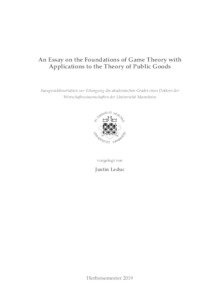|
An essay on the foundations of game theory with applications to the theory of public goods
Leduc, Justin
![[img]](https://madoc.bib.uni-mannheim.de/53161/1.hassmallThumbnailVersion/Dissertation%20-%20Justin%20Leduc.pdf)  Vorschau |
|
PDF
Dissertation - Justin Leduc.pdf
- Veröffentlichte Version
Download (1MB)
|
|
URL:
|
https://madoc.bib.uni-mannheim.de/53161
|
|
URN:
|
urn:nbn:de:bsz:180-madoc-531610
|
|
Dokumenttyp:
|
Dissertation
|
|
Erscheinungsjahr:
|
2019
|
|
Ort der Veröffentlichung:
|
Mannheim
|
|
Hochschule:
|
Universität Mannheim
|
|
Gutachter:
|
Troeger, Thomas
|
|
Datum der mündl. Prüfung:
|
23 September 2019
|
|
Sprache der Veröffentlichung:
|
Englisch
|
|
Einrichtung:
|
Fakultät für Rechtswissenschaft und Volkswirtschaftslehre > Wirtschaftstheorie (Tröger 2010-)
Außerfakultäre Einrichtungen > GESS - CDSE (VWL)
|
|
Fachgebiet:
|
330 Wirtschaft
|
|
Freie Schlagwörter (Englisch):
|
philosophy of economics , game theory , epistemology , action theory , philosophy of mind , folk-psychology , public economics , public goods , voluntary provision , demand-rights , collective intentions , legitimacy
|
|
Abstract:
|
The dissertation consists of three essays, one in philosophy of economics and two in public economics. In Chapter 1, I argue that both behaviorism and mentalism fail to take into account the fact that preference revelation is mediated by regulative folk-psychology, a discursive practice used to regulate one’s own as well as others’ behavior. In Chapter 2 and Chapter 3, I support my argument by showing that paying attention to regulative talk can help economists improve their models. To do so, I draw a distinction between legitimate and non-legitimate public goods. Only the legitimate public goods are systematically accompanied by an exertion of a system of demand-rights--a specific form of regulative talk. I develop a theory of public good provision in the presence of legitimate public goods and evaluate its potential to explain some stylized facts of public good experiments.
|
 | Dieser Eintrag ist Teil der Universitätsbibliographie. |
 | Das Dokument wird vom Publikationsserver der Universitätsbibliothek Mannheim bereitgestellt. |
 Suche Autoren in Suche Autoren in
Sie haben einen Fehler gefunden? Teilen Sie uns Ihren Korrekturwunsch bitte hier mit: E-Mail
Actions (login required)
 |
Eintrag anzeigen |
|
|
